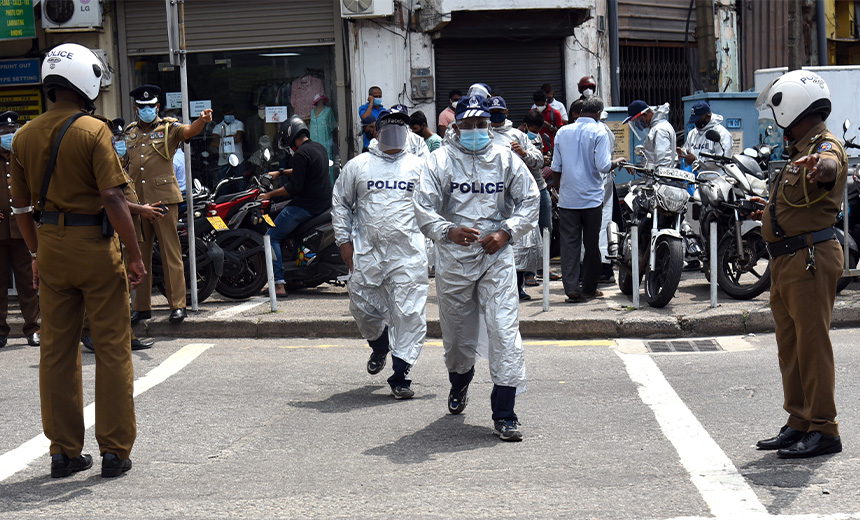Fraud Management & Cybercrime
,
Fraud Risk Management
,
Geo Focus: Asia
Chinese Cybercrime Groups Ran Operations in Rented Hotels and Guest Houses

Sri Lankan authorities have arrested more than 200 Chinese nationals who they say overstayed their visitor visas and engaged in large-scale financial scam operations targeting victims across Asia.
See Also: OnDemand | 2024 Phishing Insights: What 11.9 Million User Behaviors Reveal About Your Risk
In a series of media statements beginning Oct. 6, Sri Lankan police announced seven raids across the nation that led to the arrest of hundreds of cybercriminals and scam operators, a large majority of whom are Chinese nationals.
Police said the groups conducted pig butchering scams, primarily luring middle-aged and elderly people to invest in fake businesses or stocks.
The raids coincided with the U.N. Office on Drugs and Crime stating last week that “highly sophisticated” Asian crime syndicates ran large-scale scam operations to steal up to $37 billion in 2023. Starting from abandoned buildings, these groups now operate out of modern, heavily fortified compounds, running well-oiled criminal service economy composed of human trafficking, illegal drug trade, pornography, prostitution and money laundering gangs (see: UN Says Asian Cybercrime Cartels Are Rising Global Threat).
A recent United States Institute of Peace study found that Chinese nationals formed a vast majority of criminal networks based in Southeast Asia. The organization estimated that scammers took in $64 billion by the end of 2023.
Many of these cartels emerged in the 1990s to run covert online gambling operations from overseas after China banned it, but the groups have since expanded operations and set up bases in Myanmar, Cambodia and Laos to run gambling, scamming and financial fraud operations targeting a global audience.
“The funds stolen by these criminal syndicates based in Mekong countries likely exceeds $43.8 billion a year – nearly 40% of the combined formal GDP of Laos, Cambodia and Myanmar,” USIP said.
The first reported raids in Sri Lanka took place in Hanwella, a town in the outskirts of Colombo where police found 30 Chinese, six Indian and six Thai nationals renting hotel rooms and private residences to conduct scam operations. Police recovered more than 500 mobile phones and other equipment and sent them to the Aradh research laboratory for forensic analysis.
Similar raids took place over the rest of the week with the largest operation netting 126 Chinese nationals on Saturday. The Special Investigation Bureau of the Kandy division said the criminal gang rented 47 rooms in a single luxury hotel to run money laundering operations. According to Newswire Lanka, authorities seized 15 desktop computers and more than 300 mobile phones from the criminals.
“The scammers tend to look for smaller hotels or similar places with a small number of staff. They would rent the entire place for an extended period and are willing to pay more than the asking price to persuade the owners to agree,” deputy inspector general of police Nihal Thalduwa told The Sunday Times.
The police on Monday said they arrested 31 more Chinese nationals in the Kandy division who were likely associated with the massive criminal gang that authorities took down on Oct. 12.
Following a spate of arrests over eight days, the Chinese embassy in Colombo in a statement boasted about the Chinese government’s efforts to tackle financial fraud and cyber scams.
“Crimes of telecom and online fraud are specialized transnational organized crimes; therefore, the Chinese government adheres to cracking down on such specialized crimes through special means,” the embassy said. “It has established special agencies, replenished special forces and strengthened specialized training to realize leapfrog improvement in capabilities and levels of cracking down on telecom and online fraud.”
The embassy also shared a statement with local news agencies Monday, stating that it fully supports law enforcement operations in Sri Lanka.
“China is closely following the recent reports that Sri Lankan police arrested a number of foreign suspects of online fraud, including Chinese nationals,” it said. “These cases not only pose a threat to the property of our two peoples, but also seriously damage China’s image and affect the traditional friendship between our two countries.”
